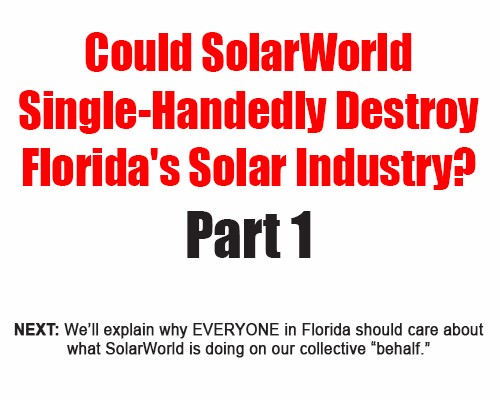With nearly 66% global market share of photovoltaic (PV) panel production, China essentially dominates the solar manufacturing industry.
The quality varies considerably, but if you’re going to buy solar panels in Florida, there’s a good chance your search will start somewhere in China.
A few years ago, the country was accused of artificially propping up its solar industry with illegal subsidies and price manipulation. And SolarWorld launched an aggressive anti-dumping campaign to stop China from flooding the market with cheap solar technology.
The campaign was successful, and many Western countries introduced tariffs and other cost-correction measures to level the playing field.
Could SolarWorld Single-Handedly Destroy Florida’s Solar Industry?
But SolarWorld is at it again, with a new round of anti-dumping complaints submitted to the US International Trade Commission and the Department of Commerce. The company wants to close “loopholes” in some of the trade remedies that emerged during the last campaign.
Shouldn’t Florida Solar Companies Be Thanking SolarWorld?
On the surface, it seems like a reasonable response. If China is indeed breaking international trade law, the solar industry should be happy that SolarWorld is leading the charge.
But the more that we learn about this most recent trade war, the more convinced we are that SolarWorld is out for blood – not for any meaningful resolutions. Despite numerous attempts at mediation, SolarWorld refuses to sit at the negotiating table.
The company isn’t simply refusing to talk with China (and Taiwan). It’s also rejecting very reasonable and impassioned pleas from solar stakeholders who want the entire industry to succeed.
According to Rhone Resch, President and CEO of the Solar Energy Industries Association (SEIA), “We oppose today’s escalation of the US-China solar trade conflict.”
He adds,
“More litigation is the wrong approach. Trade litigation is a blunt instrument and, alone, is incapable of resolving the complex competitiveness issues that exist between the US and Chinese solar industries. It’s time to end this conflict, and negotiations must play a role.”
In place of litigation, SEIA has publicly recommended a compromise that would phase out current trade tariffs in exchange for “confidence-building measures” from China.
SolarWorld won’t budge.
But you know what makes this case truly fascinating?
Although SolarWorld claims to be acting on behalf of the US, it isn’t actually American. The company is German, and it’s on a kamikaze mission to solve a problem that America’s official solar trade association doesn’t believe exists. In fact, SEIA is so opposed to the lawsuit that it’s actually prepared to offer legal advice to China’s defense team. And SEIA will continue denouncing any efforts to impose punitive measures on Chinese solar imports.
Now SolarWorld is fighting a battle on 2 fronts.
Here’s a free piece of time-tested military strategy advice:
If you go to war without the support of the side you’re representing – you’ve picked the wrong side.
But there’s a very good chance that SolarWorld could actually succeed in its mission of higher and stricter tariffs. Despite the pushback. Despite the negative publicity. Despite the absurdity.
And the consequences could be dire.
But so what. You’re a homeowner or a solar PV installer. You run a business and have a family. Why should you care about some silly proxy war fought between SolarWorld and China (via the United States)?
That’s a very good question. And in Part 2, we’ll explain why EVERYONE in Florida should care about what SolarWorld is doing on our collective “behalf.”

